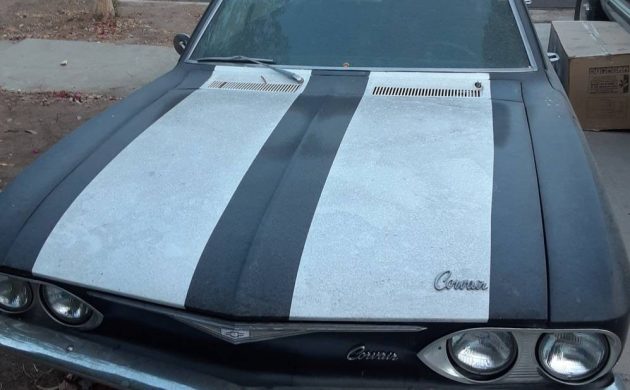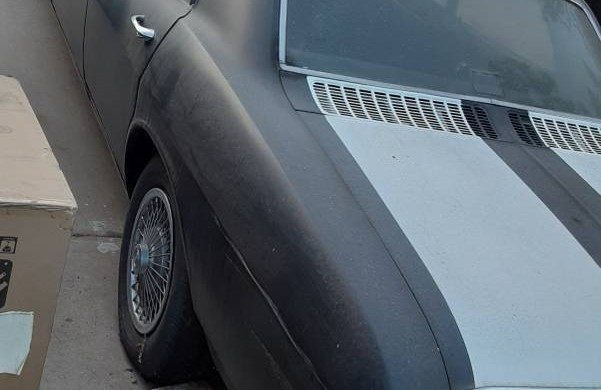Stretch limousines are not unusual sights. Especially if they’re Cadillacs or Lincolns. And sometimes you’ll run across one that was based on a vintage automobile. But this conversion is the product of a father and son project: a stretch limo based on a 1966 Chevy Corvair. We’re told it’s complete and runs well with no mechanical work needed. But I would love to know the story of how this came about. Located near Burbank, California, this 1-of-1 is available here on craigslist for $8,500. One of the more unusual finds by our reader, Pat L.!
The Corvair was born in 1960 as Chevy’s unusual response to the new compact car movement. It had an air-cooled engine mounted in the rear much like VW had done with the Beetle. Though unconventional by standards of the day, it was popular enough to sell 1.8 million copies over two generations and 10 years. Part of Corvair’s eventual undoing was a negative safety campaign launched by Ralph Nader in the mid-1960s, and – as a result – Corvair sales for 1966 were half that of the year before.
One of the body styles offered on the Corvair in 1966 was the 4-door Monza hardtop, which is what appears to have been used to create the stretch limo seen here. Of 103,700 Corvairs built that year, about 12,500 would have started like this. We don’t know when this conversion was created by the father/son duo or how well the conversion was done. But the dad has since passed away and the car is being sold from his estate. While we don’t get to see what the interior looks like, it’s painted hot rod black (flat black that looks blue to me) and white stripes. At 75,000 miles, we’re told the brakes are new, the tires are good, and it runs great with no mechanical issues. So, I guess you could clean it up and start shuttling passengers to prom night.







When a cars chassis has been cut up by a home mechanic, yet there are no pictures showing the work it’s an automatic hard pass. Too many safety issues, especially at that price and with the overall vagueness of the ad. Using nearly half of the ads 5 pictures to show other incomplete projects does nothing to inspire faith either.
If they want $8,500 for this I’d hate to see what the asking price will be for the other cars.
Steve R
In went to see a late-model Convertible around 40 years ago….
Car looked ok in the dark, but something was not quite right.
I asked a few polite questions, and eventually the seller could not help but brag about putting it together from two cars, one front and one rear total loss!
Impressive work. I couldn’t leave fast enough.
It all hinges on how well it was done. At first glance, looks pretty good for a home job. A shot of the underside would tell all. Price is not bad for what could be a real head turner at the next show.
Pun aside, how well it was done and whether it “hinges” would be the main concern…
I’d give $100 for the hubcaps and scrap the rest.
“Nadersines” – one attempt to address the rollover issue.
If you’re gonna make a limo, don’t put racing stripes on it. And like The Rolling Stones sang, “Paint it Black.”
There is no accounting for taste.
Screw Nader. He’s crazy! This would’ve made an awesome limousine!
The Corvair’s monocoque construction doesn’t lend itself to extension. Essentially the engine has been relocated which required modifying drivetrain controls, wiring etc. Body sag and flex are a concern along with ground clearance. The additional curb weight won’t benefit performance. These are just a few reasons why this car should have remained a ‘what if?’
Did I miss something or have you seen this in person, but in the very few pictures aand description, it says nothing about a relocation of the engine and transmission.
I guess what A.G. means is after doing this to the car the engine and trans-rear are now 4-6 feet away from the driver’s position as it was when new. Or you could say the engine and trans-rear are in original position and driving controls and compartment have been moved forward 4-6 feet. Or both were moved 2-3 feet to add center section. All the same no matter how you say it. Evident by the pictures in my opinion. I don’t think you missed anything, it’s just a funny play of words, lol.
Relocation in this instance means
“moved further back from the front” ……. or
longer wheelbase.
Are you kidding? I think it looks gorgeous! If only more pics were posted.
“Unsafe at Any Speed” Thanks Mr Nader
By the front chrome bar, this looks to be a 1965.
Taillights are wrong for a ’65–I had a ’65, and the taillights for that year were one year only. This might be a car with the front clip from a ’65 and the rear from some other year. The other weird thing is the “Corvair” script in two different places on the front clip–both on the “frunk” lid and on the front fascia. The script on the frunk lid was ’65 only and it moved to the fascia after that. So this was probably put together from parts from a bunch of different years.
I think they just put a 65 hood on a 66. The 65 had the script Corvair on the hood, while the 66 had it on the front valence. Also, the chrome lock bar is a 66 or later. The 65 bar had the center background painted red, while the 66 and later had it painted blue.
I guess it only rains on the passenger side.
I love Corvairs. This one not so much.
OK. Not for the last time, I am sure. Nader never criticized the 2nd-generation Corvair. His beef was that it took GM so long to fix the problems with the 1st-generation Corvair. It says right there in “Unsafe At Any Speed” that the 2nd-Generation Corvair was OK.
Rumors and misrepresentations were popular back then. Thanks to the internet, humans have overcome this problem🤣.
If anything, Nader did the 2nd-gen Corvair a favor, as GM was loath to be seen as capitulating, so they committed to extend production by an extra year or two than they might have otherwise, tho’ that also helped them recoup more of their sunk costs in its development and tooling.
What really killed the Corvair was the Mustang. GM just had to get a piece of that burgeoning new pony-car market and already had the Camaro/Firebird in development to compete, and there wasn’t a solid business case for three compact GM sport coupes (sedans were a minuscule share of 2nd-gen Corvairs), esp. when one of them shared nearly nothing with other models and didn’t offer competitive performance speedwise (sweet-handling tho’ it was), so the Corvair had to go.
Came here to say this! I’ll just add the pithy version;
Nader didn’t kill the Corvair, Lee Iacocca did.
Yes it is different, no interior or engine photos. They list the white stripes for the people that did not notice them.
A limousine w no a/c no safety perimeters, probably rides like dirt, parts car at best
At 1/10th the price and with scrap metal fetching good money it’d be worth cutting the extension out and putting the original halves back together. Get it safe and legal from there and drive while fixing. For $8500 though you should probably (still) be able to get a really good Corvair sedan.
Let’s see, a Corvair limo, something PeeWee Herman might show up to an awards ceremony in,,,or 17 clowns? I can appreciate just about any father/son project, only because I have nothing in common with MY son, but I think their talents lie in other areas. I think a good bump, and you be riding on your axx. Nice try, but what a waste.
My first car was a ’65 coupe with the 110 hp engine. Fun little car, cheapest thing GM sold at the time. $2000 out the door. Handled great, good in snow but noisy inside. I pulled the back seat and stuffed the inside of the cushions with fiberglass. Cut noise by half. Unit bodies like this are not good for extensions. Just sheet metal – no frame. I bet this thing is like a wet noodle on rough streets. Strange project. Waste of time. Worth $100 max.
I have a 65 convertible that I enjoy very much! This project car may have been a fun project, but it’s sad.
Runs great says the add, but the chunck of wood behind the wheel says stopping is optional.
As mentioned need many more photos and hit the thing with a sponge ffs.
The automatic Powerglides in the Corvair did not have a “Park” mechanism.
The parking brake (left-hand pull lever under the dash) had to be engaged to prevent the cars from rolling away. If the parking brake was defective, you carried a tire block. Parking on a hill was a bad idea then!